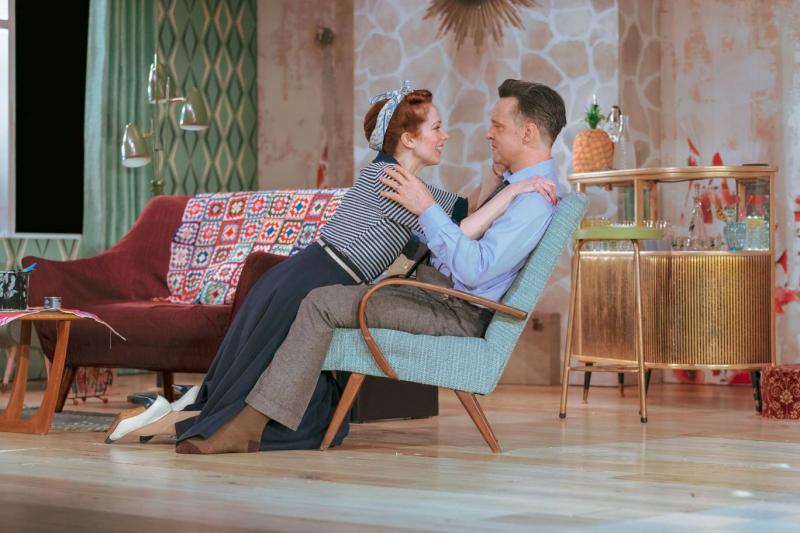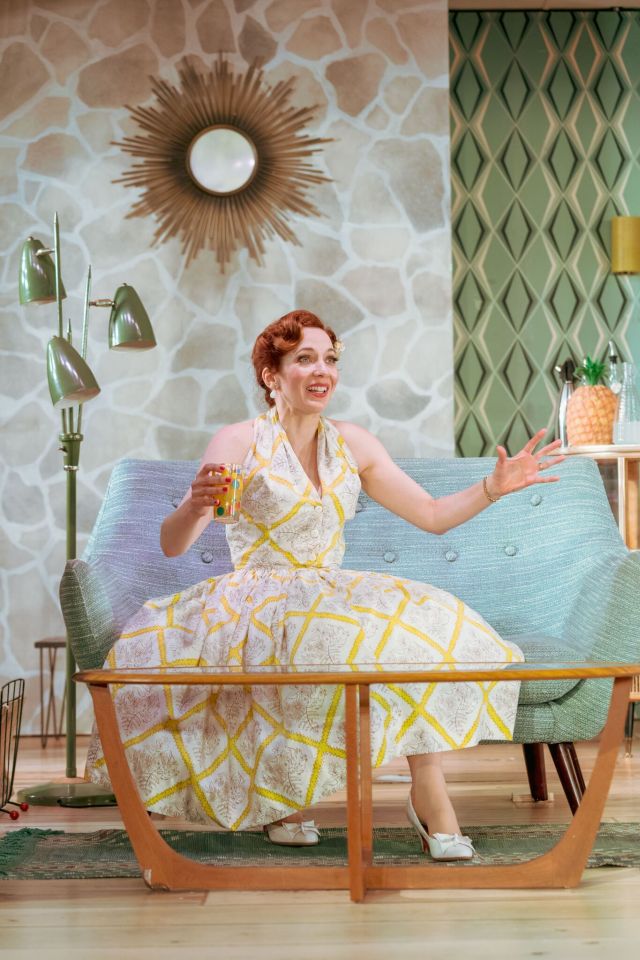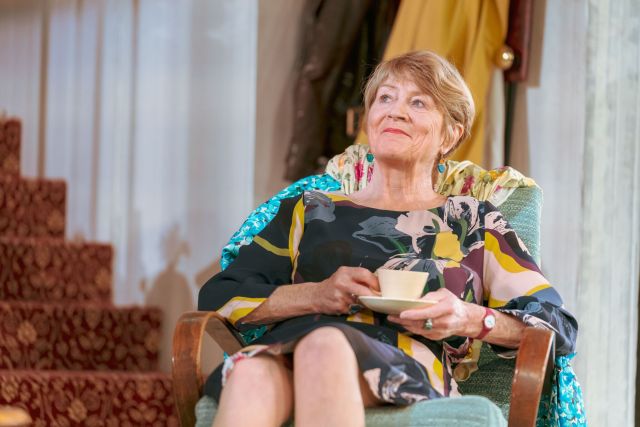Home, I'm Darling, Duke of York's Theatre review - Katherine Parkinson rules the roost | reviews, news & interviews
Home, I'm Darling, Duke of York's Theatre review - Katherine Parkinson rules the roost
Home, I'm Darling, Duke of York's Theatre review - Katherine Parkinson rules the roost
National Theatre transfer hits the West End sweet spot

The Fifties? They were terrible: bone-cold houses where people huddled round the fireplace for heat, empty Sundays that lasted a month, drawn-out rationing, bread you could build houses with.
But it's not the British '50s where Judy (Katherine Parkinson, pictured below) is so determined to bury her ostrich's head in this glistening play from the author of Posh. It's the American '50s, surely: all bobby sox and polka dots and spick and span and jive. You feel by the end of Home, I'm Darling that Parkinson, in her candy-caned dress, has set upon you with her feather-duster – poked you, tickled you, flicked out the fluff and made you think.
 What does it mean to aspire to be a 1950s housewife? Why is the play's title so grammatically challenged? Retro-chic is revealed to be the order of the day upon curtain up at the Duke of York's. No home from the actual '50s has ever looked quite so perfectly period as Judy and her husband Johnny's two-up two-down: green sitting room, yellow kitchen, muted turquoise bedroom, every fabric and furnishing a tiny testament to modern living. Spindly-legged sofas sit alongside tubular light stands of the kind my antique dealer friends now sell for vastly more than Georgian side tables.
What does it mean to aspire to be a 1950s housewife? Why is the play's title so grammatically challenged? Retro-chic is revealed to be the order of the day upon curtain up at the Duke of York's. No home from the actual '50s has ever looked quite so perfectly period as Judy and her husband Johnny's two-up two-down: green sitting room, yellow kitchen, muted turquoise bedroom, every fabric and furnishing a tiny testament to modern living. Spindly-legged sofas sit alongside tubular light stands of the kind my antique dealer friends now sell for vastly more than Georgian side tables.
When Parkinson sashays in, with "Mr Sandman" on the radio, we wait for American accents. In fact, this is Welwyn Garden City in the heart of the British 'burbs, and Parkinson from the off is utterly bewitching. Her chuckle as throaty as lemon curd, she conjures flickers of Esther Rantzen, Grayson Perry and the Good Witch of the North. She parades like a swaying hen ready to peck, that feather duster poised to strike at any moment.
Home, I'm Darling proposes the '50s as a lifestyle choice, at least for a couple who view themselves as "appallingly happy": Judy specifically exults in "not remotely going crackers". Johnny (Richard Harrington) is in real estate hoping for that midlife, middle-management promotion, whereas Judy has left her better-paying job to be the perfect little woman who can say a morning goodbye to Johnny with breakfast eggs and an evening hello with slippers, sundowners, and sex. No housework exists for him; that's been banished under the sink, along with bad language and bad news.
Wade's script boasts more sparkles than a box of Daz and keeps the sly, playful, sharp one-liners coming. Under Tamara Harvey's direction, it is matched by Anna Fleischle's set design: a living doll's house which at one point cleans itself up in the most miraculous way. The production has a soundtrack to match, deliciously creaky in places and packed with your favourite nostalgia-inducing hits.
 And yet, why has Judy locked herself into a mid-century Woman's Hour and turned her back on women's rights? She almost wills her increasingly uneasy partner into an affair and herself into domestic emptiness. Perhaps Home, I'm Darling is about a woman searching for her societal role or about the loss of communication or, indeed, fixing the holes where the dust gets in. On the one hand, Judy's gingham paradise represents a forcible reaction to a "filty childhood" on a feminist commune. Is she hiding, one inevitably wonders, from abuse, fashioning a safe, rigidly perfect fantasy world that's tinged with trauma and OCD? Or maybe the issue is simply the real threat of middle-class downsizing.
And yet, why has Judy locked herself into a mid-century Woman's Hour and turned her back on women's rights? She almost wills her increasingly uneasy partner into an affair and herself into domestic emptiness. Perhaps Home, I'm Darling is about a woman searching for her societal role or about the loss of communication or, indeed, fixing the holes where the dust gets in. On the one hand, Judy's gingham paradise represents a forcible reaction to a "filty childhood" on a feminist commune. Is she hiding, one inevitably wonders, from abuse, fashioning a safe, rigidly perfect fantasy world that's tinged with trauma and OCD? Or maybe the issue is simply the real threat of middle-class downsizing.
Others get their own look-in, too. Siubhan Harrison, as faithful friend Fran, joins Hywel Morgan's Marcus in waltzing and jiving through the scene changes while a bit of #MeToo creeps into the plot. Susan Brown (late of Angels in America at the National and on Broadway and pictured above) and Sara Gregory are spot-on as Judy's irksomely modern mother and Johnny's eminently 21st-century boss. The first half stands as a neatly-finished one-act only to find by the end of the second (and after many diversions) that more questions have been posed than answered along the way. Still the journey throughout is altogether delightful – more so, even, than angel cake.
rating
Share this article
The future of Arts Journalism
You can stop theartsdesk.com closing!
We urgently need financing to survive. Our fundraising drive has thus far raised £49,000 but we need to reach £100,000 or we will be forced to close. Please contribute here: https://gofund.me/c3f6033d
And if you can forward this information to anyone who might assist, we’d be grateful.

Subscribe to theartsdesk.com
Thank you for continuing to read our work on theartsdesk.com. For unlimited access to every article in its entirety, including our archive of more than 15,000 pieces, we're asking for £5 per month or £40 per year. We feel it's a very good deal, and hope you do too.
To take a subscription now simply click here.
And if you're looking for that extra gift for a friend or family member, why not treat them to a theartsdesk.com gift subscription?
more Theatre
 Ragdoll, Jermyn Street Theatre review - compelling and emotionally truthful
Katherine Moar returns with a Patty Hearst-inspired follow up to her debut hit 'Farm Hall'
Ragdoll, Jermyn Street Theatre review - compelling and emotionally truthful
Katherine Moar returns with a Patty Hearst-inspired follow up to her debut hit 'Farm Hall'
 Troilus and Cressida, Globe Theatre review - a 'problem play' with added problems
Raucous and carnivalesque, but also ugly and incomprehensible
Troilus and Cressida, Globe Theatre review - a 'problem play' with added problems
Raucous and carnivalesque, but also ugly and incomprehensible
 Clarkston, Trafalgar Theatre review - two lads on a road to nowhere
Netflix star, Joe Locke, is the selling point of a production that needs one
Clarkston, Trafalgar Theatre review - two lads on a road to nowhere
Netflix star, Joe Locke, is the selling point of a production that needs one
 Ghost Stories, Peacock Theatre review - spirited staging but short on scares
Impressive spectacle saves an ageing show in an unsuitable venue
Ghost Stories, Peacock Theatre review - spirited staging but short on scares
Impressive spectacle saves an ageing show in an unsuitable venue
 Hamlet, National Theatre review - turning tragedy to comedy is no joke
Hiran Abeyeskera’s childlike prince falls flat in a mixed production
Hamlet, National Theatre review - turning tragedy to comedy is no joke
Hiran Abeyeskera’s childlike prince falls flat in a mixed production
 Rohtko, Barbican review - postmodern meditation on fake and authentic art is less than the sum of its parts
Łukasz Twarkowski's production dazzles without illuminating
Rohtko, Barbican review - postmodern meditation on fake and authentic art is less than the sum of its parts
Łukasz Twarkowski's production dazzles without illuminating
 Lee, Park Theatre review - Lee Krasner looks back on her life as an artist
Informative and interesting, the play's format limits its potential
Lee, Park Theatre review - Lee Krasner looks back on her life as an artist
Informative and interesting, the play's format limits its potential
 Measure for Measure, RSC, Stratford review - 'problem play' has no problem with relevance
Shakespeare, in this adaptation, is at his most perceptive
Measure for Measure, RSC, Stratford review - 'problem play' has no problem with relevance
Shakespeare, in this adaptation, is at his most perceptive
 The Importance of Being Earnest, Noël Coward Theatre review - dazzling and delightful queer fest
West End transfer of National Theatre hit stars Stephen Fry and Olly Alexander
The Importance of Being Earnest, Noël Coward Theatre review - dazzling and delightful queer fest
West End transfer of National Theatre hit stars Stephen Fry and Olly Alexander
 Get Down Tonight, Charing Cross Theatre review - glitz and hits from the 70s
If you love the songs of KC and the Sunshine Band, Please Do Go!
Get Down Tonight, Charing Cross Theatre review - glitz and hits from the 70s
If you love the songs of KC and the Sunshine Band, Please Do Go!
 Punch, Apollo Theatre review - powerful play about the strength of redemption
James Graham's play transfixes the audience at every stage
Punch, Apollo Theatre review - powerful play about the strength of redemption
James Graham's play transfixes the audience at every stage
 The Billionaire Inside Your Head, Hampstead Theatre review - a map of a man with OCD
Will Lord's promising debut burdens a fine cast with too much dialogue
The Billionaire Inside Your Head, Hampstead Theatre review - a map of a man with OCD
Will Lord's promising debut burdens a fine cast with too much dialogue

Add comment